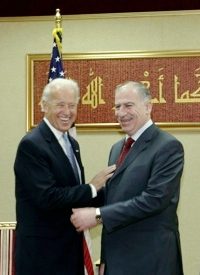
Vice President Joe Biden said Thursday Iraq may need U.S. military assistance beyond the scheduled withdrawal of the last of the American forces at the end of this year under the Status of Forces Agreement signed by the United States and Iraqi governments in 2008, Voice of America News reported.
Following a meeting with Prime Minister Nouri Al-Maliki and other officials during his unannounced trip to Baghdad, Biden praised the country’s progress toward democratic rule in the nearly seven years since American forces toppled the regime of Saddam Hussein.
“The Iraqi people for the first time, I suspect I would argue in their history, are on the verge of literally creating a country that will be democratic, sustainable and God willing prosperous and it can have a dramatic impact on this entire region,” said Biden who arrived in Iraq after visits to Pakistan and Afghanistan. Referring to the removal of U.S. combat units last August, Biden said, “Our mission has now fundamentally shifted since September,” and noted it is due to “shift again” at the end of 2011. “We will probably be in the position of still maintaining and giving support. We will probably be in the position of still, in certain, specific areas, having to train and equip” Iraqi security forces, he said.
There are about 48,000 U.S. troops still in Iraq, down form a peak of 170,000 during the surge of 2007. Biden did not say how many might be needed to train and equip Iraqi forces after December 2011, but an extended stay could have political repercussions in both countries. The Iraq war has long been unpopular with the American public and al-Maliki is said to be under intense pressure from Shi’ite members of his coalition government to insist on a complete withdrawal by the December 31 deadline. Yet both Iraqi and U.S. officials say the country will not be able to defend its borders, according to the Voice of America report.
Yet al-Maliki a little more than two weeks ago said U.S. assistance would not be needed beyond the deadline and that all U.S. soldiers would be gone by then. “The last American soldier will leave Iraq,” the Iraqi Prime Minister said in an interview published in Wall Street Journal on December 27. There would be no modification of the Status of Forces Agreement, he said. “This agreement is not subject to extension, not subject to alteration. It is sealed.”
Advocates of an extended U.S. presence in Iraq include The Brookings Institute and Ryan Crocker, the former U.S. ambassador in Baghdad. But the White House was quick to endorse al-Malki’s stand for no alteration.
“The prime minister is exactly right,” a senior White House official told the Journal, adding the Obama administration was “on track” to complete the withdrawal of all troops by the end of the year.
The Iraqi leader had previously said his government would be open to a renegotiation of the timeline if necessary. On a visit to Washington in 2009, al-Maliki told an audience at the Institute of Peace that “if Iraqi forces required further training and further support we shall examine this at that time, based on the needs of Iraq.” His recent hard line on withdrawal may reflect the impact on Iraqi politics of Muqtada al-Sadr, the militant Shi’ite cleric who has returned to Iraq after spending the last four years in Iran. In a fiery speech at mosque in Najaf, al-Sadr called for continued resistance, armed and otherwise, to the American presence in Iraq. “We say to the Iraq government: Enough occupation and enough slavery! We’ve heard that the government has pledged to get the occupation out, and we’re waiting for the promise…We’re watching you….” He called for “resisting the occupation through armed cultural and all kinds of resistance … against our joint enemy, America, Israel and Britain.” The cleric called an end to the occupation “a legal and religious obligation.”
Whether al-Sadr and the 40-member Shi’ite faction in the nation’s parliament could block an extension of the deadline is not known. What may be of greater concern to the United States is the link to Iran al-Sadr represents after spending the past four years there, and the growing influence Tehran may exert on the politics of neighboring Iraq. Iran, along with Saddam’s Iraq and North Korea, was labeled part of the “axis of evil” by President George W. Bush and hostility between Washington and Tehran has continued over Iran’s alleged efforts to develop nuclear weapons. While U.S. officials in both the Bush and Obama administrations have not ruled out a military strike against Iran, another war in the Middle East is something the United States can ill afford, both financially and militarily, while it is still fighting a nine-year-old war in Afghanistan and winding down its mission in Iraq. As Biden recalled in a speech to American troops in Baghdad yesterday, that mission has so far resulted in more than 4,000 American dead and some 32,000 wounded.
“The thing that amazes me about you all,” Biden said, “is no matter where I go in these hospitals I always ask the family that is there or the soldier, sailor, marine, airman that is there, who is the one injured, ‘what can I do for you?’ And almost without exception the only request I ever get is, ‘Mr. Vice President can you help me get back to my unit?’ “
Photo: U.S. Vice President Joe Biden, left, shares a light moment with Iraq’s Parliament Speaker Osama al-Nujaifi, right, in Baghdad, Iraq, Jan. 13, 2011: AP Images



